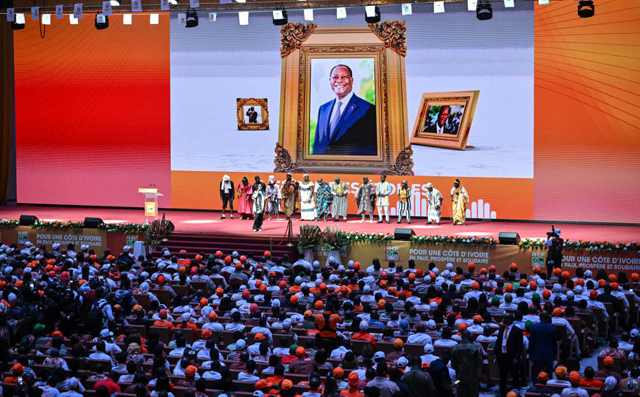News Flash

ABIDJAN, June 22, 2025 (BSS/AFP) - A US-trained economist who appears an almost immovable cornerstone of Ivory Coast's political life, Alassane Ouattara spells stability to his admirers but authoritarianism to his detractors after three terms as president.
If he accepts his party's nomination on Saturday to run for a fourth time, he will be the clear favourite to win the October election after the main opposition leaders were excluded by the courts.
Supporters have hammered home that Ouattara -- who turns 84 in January -- is their undisputed leader.
"Africa has very few leaders like Ouattara. He has experience, serenity and knowledge of the world; he is an essential interlocutor in the region," a close associate said.
But for the opposition, the president since 2011 is another African leader who has taken the path of authoritarianism.
Known as "Ado" after his initials, Ouattara had a long career at the International Monetary Fund and Central Bank of West African States before being tapped for prime minister in 1990.
Born in the central town of Dimbokro, Ouattara did the bulk of his schooling in neighbouring Burkina Faso, where his father was from.
It fed a controversy over his nationality that has repeatedly come back to haunt him.
After the 1993 death of the country's revered founding leader Felix Houphouet-Boigny, the unity that had been safeguarded unravelled. Ouattara was barred from the 1995 vote and boycotted it, and again five years later faced accusations he was insufficiently Ivorian.
The repeated barring is widely seen as a trigger for the 2002 political crisis that split the country in half for almost a decade.
Ouattara's supporters backed rebels who controlled the north, pitting themselves against then-president Laurent Gbagbo, who held sway in the south.
Ouattara eventually won election in 2010 but Gbagbo contested the result, leading to violence which killed 3,000 people and culminated in Gbagbo's arrest.
- Growth but inequality -
Once in office, Ouattara is credited with making good use of his contacts to pump investment into the war-scarred economy.
Fourteen years on, he talks up his macroeconomic record and a nation transformed by growth, which has topped seven percent almost yearly.
Known as a tireless worker who gets by on little sleep, Ouattara also points to his bringing of electricity to rural areas and building of roads, bridges and sports stadiums.
But social inequality remains stark and corruption plagues the west African nation.
The former French colony and leading cocoa producer is weighed down by a public debt of around 60 percent of GDP, while huge gaps in education and health coverage remain.
On the international stage, the hosting and subsequent home victory in last year's Africa Cup of Nations football tournament was a big plus.
But security in the Sahel region has worsened during Ouattara's third term. He now has to do business with neighbours led by hostile military juntas -- notably in Burkina Faso -- who are battling jihadist violence, a threat Ivory Coast has so far managed to contain.
After the 2023 overthrow of his Nigerien counterpart Mohamed Bazoum, Ouattara said he was ready to intervene militarily alongside the west African community, although his neighbours did not follow through.
- 'Potential successors' -
Ivory Coast has regained stability, but protests are rarely permitted under Ouattara's tight grip on power.
National reconciliation efforts have seen few of his supporters tried for the crimes committed during the 2010-2011 crisis.
His rival Gbagbo's recent acquittal by the International Criminal Court in The Hague enabled his return home in 2021.
He was granted a pardon a month later, suggesting the wounds of the unrest were beginning to heal.
But the technocratic Ouattara has not gone as far as to offer an amnesty to his old opponent, leaving him out of the running for this year's polls.
"If you don't give others the ability to fight for power, it's no longer democracy," Gbagbo has said.
After being re-elected in 2015 with 83 percent of the vote, Ouattara promised not to run again given the constitutional two-term presidential limit.
But when his chosen successor Amadou Gon Coulibaly died suddenly, Ouattara changed his mind, buoyed by a constitutional revision which he argued reset his number of terms to zero.
The move sparked protests, with the main opposition boycotting the 2020 ballot and accusing Ouattara of being a "dictator". He won 94 percent of the vote.
Since then, Ouattara -- a Muslim who is married to a French Christian -- has often said there are "a half-dozen potential successors" in line.
For now, they will have to wait.